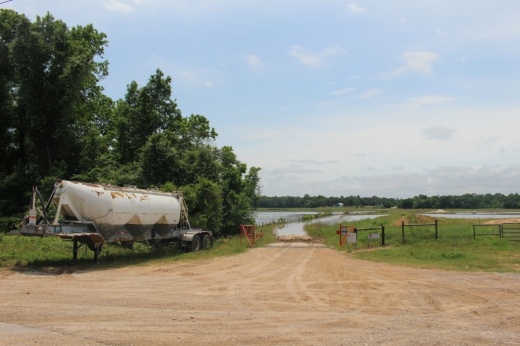The meeting, which was held by the Texas Commission on Environmental Quality, is required as part of the process to be granted a concrete batch plant permit.
TCEQ has issued a preliminary recommendation to approve Buendia Concrete’s application to build a concrete batch plant on Superior Road. TCEQ still needs to make a final decision to approve the application.
During the meeting, residents were given an opportunity to ask TCEQ officials and Buendia Concrete President Alejandro Buendia questions before beginning a formal comment period in which responses to questions were not allowed. The meeting scope was limited to air-quality concerns.
Residents asked questions related to accountability and monitoring, seeking assurance that the proposed plant would not harm air quality and whether anyone would be monitoring the plant for compliance. TCEQ officials responded that if an application meets their permit guidelines, then per state requirements, they must grant the permit. If an applicant follows the permit guidelines, then it will not cause harm, according to TCEQ.
Several residents said the permitting process lacks regulation, and TCEQ’s responses did not fully address their concerns. Robert Endres, the president of the Sendera Lake Estates Homeowners Association, a neighborhood within 2 miles of the proposed plant, called the meeting a “sham.”
“They didn’t allow enough time to ask questions,” he said in a follow-up phone call. “[They gave] very standard, canned responses.”
Back and forth
A typical concrete batch plant mixes water, cement, fine aggregates such as sand, and coarse aggregate such as gravel in a large drum to create concrete. Additives such as fly ash may be added, but TCEQ prohibits the use of additives that release volatile organic compounds, or chemicals that vaporize in the air.
A paper titled "Guide to air quality permitting for concrete batch plants" published by the University of Texas at Austin Environmental Clinic School of Law and Texas Access to Justice Foundation lists air pollutants such as carbon monoxide, nitrogen oxides, particulate matter and formaldehyde as possible pollutants generated by plants.
Residents nearby to the proposed batch plant, which is located at 1301 Superior Road, said their primary concerns are dust and pollutants being released into the air, which they fear cause negative environmental and health effects.
“The list of potential health effects is bothersome at the very least and likely fatal to susceptible community members,” resident Graham Marshall said. “[It’s] a toxic cocktail.”
However, TCEQ officials said Allison Jackson, who is within the TCEQ Office of Air, Air Permits Division, said many people were confusing some of the potential emissions from a cement plant, not a concrete batch plant. For instance, there are no quantifiable amounts of crystal silicates in the sand used by concrete batch plants, one official said.
“A concrete batch plant is essentially a mixer,” Jackson said.
TCEQ officials said that during a technical review of the application, they computed “worst-case” scenarios using the highest possible emissions from the proposed plant, and it still met the requirements. Officials also reiterated they were simply following state and federal guidelines during the permitting process.
Meanwhile, Buendia assured residents that he hears their concerns, and he is committed to following all protocols.
“We are concerned about safety. ... We want to make sure we [follow] these measures,” he said. “I’m going to go by the strictest standards to make sure this plant is top-notch. That’s all I can say to you.”
Still, residents asked TCEQ officials how they can be assured that once built, a plant will follow permit guidelines and that particulate matter will be restricted to the 440-yard parameter designated by the permit. Residents said the burden of compliance seems to fall largely on them, not the TCEQ, to ensure facilities are operating according to permit guidelines by filing complaints.
Trish Matthews, official court reporter for Harris County’s 230th Criminal District Court, said she has had TCEQ lawsuits in her court and seen firsthand the lack of regulation.
“There is no regulation; there are no inspections; and ... nothing happens until there are complaints. How many complaints does it take before TCEQ steps in?” she said. “[I’ve seen] lawsuits have been going on for years, and nothing has been done, and those businesses are still operating.”
Residents also asked how complaints are evaluated. One official explained that when the TCEQ documents noncompliance, it evaluates it against an agency document that provides guidance on how to address the violation based on the type of violation. For instance, some are addressed without penalty, while other more egregious or repeat violations may require the facility to be fined and corrective steps taken.
Buendia said that because his application is for an air-quality permit with enhanced controls, he will be operating under stricter guidelines than if it was a standard air permit.
One resident questioned what other information the TCEQ might need to change its preliminary decision and not grant a permit.
TCEQ officials responded that there have been times additional information has been provided and they have then denied a permit. However, when pressed, officials did not provide examples of what information was provided and instead clarified that the only reason they would be able to deny a permit is if it was proven that the applicant did not meet permit requirements.
According to previous reporting from Community Impact Newspaper, the TCEQ has a track record of approving the vast majority of applicants. In 2020, it approved 220 of the 251 concrete batch standard permit applications that were submitted and denied just one of them. The remaining were either pending, incomplete, withdrawn or void, according to information from the TCEQ obtained via an open records request.
Residents may still have other avenues to explore protesting, such as for stormwater and wastewater permits.
Overall, Endres said he was disappointed with the public hearing.
“In my mind, this hearing was a formality,” he said. “It was intended to be opaque.”





